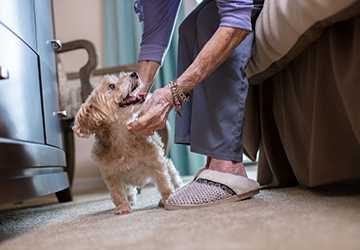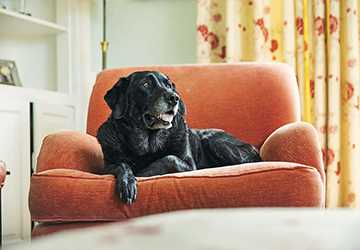As our beloved furry companions age, it's essential to ensure their golden years are filled with comfort and ease. Just like humans, pets are affected by aging, which can lead to physical limitations and challenges. However, by making thoughtful adjustments to your home, you can make it more accessible to your aging pet so they can navigate their environment safely and gracefully.
This article presents practical tips and ideas for creating a comfortable, warm, and safe environment for your senior pet.
Anti-slip floor covering
Ensuring non-slip floors is one of the most important aspects of making your home pet-friendly for senior animals. As pets age, their joints become less stable, making them more likely to slip.
Consider installing non-slip floor coverings, such as rubber mats or carpets, to prevent accidents. They can support and stabilize aging pets as they move around the house. Be sure to secure rugs and rugs to avoid tripping hazards.

Ramps and steps
Stairs and high heels can be difficult for older pets, especially those with arthritis or joint problems. To make your home more accessible, invest in ramps and steps to help your furry friends overcome these challenges.
You can find portable or permanent options that match your home decor. Ramps and steps can help pets reach their favorite spots and reduce joint stress.
Elevated food and water bowls
As you age, bending over to eat or drink from a low bowl can be uncomfortable and strain your neck and back. Place food and water bowls at a height where they can easily reach them without bending. This small change can make a big difference in your daily comfort.
Soft and supportive bedding
Provide your elderly pet with a comfortable, supportive bed that meets their needs. Known for their superior comfort, orthopedic beds are an excellent choice as they provide the necessary cushioning for sore joints and tired muscles, allowing your furry friend to rest comfortably.
Make sure your pet's bed is carefully placed in a warm and draft-free area, away from any potential dangers or disturbances that could disrupt the sleep he deserves.
Adequate lighting
As pets age, their vision decreases, making navigating in dimly lit areas increasingly tricky. Adequate lighting throughout your home is crucial, especially in rooms where pets frequent.
Installing night lights or motion-activated lights near hallways and stairs effectively improves nighttime walking safety and prevents accidents. This thoughtful adjustment improves their ability to move comfortably and adds a layer of security to their daily lives.
Door changes
Wider doors are especially beneficial for older pets, especially those who are in wheelchairs or have limited mobility. Wider doors allow for easier passage, making it easier for your pet to move from room to room. This change may require professional help, but it can significantly improve your pet's quality of life.
Care and hygiene
Proper care and hygiene for older pets is crucial. Older pets may have difficulty grooming themselves as effectively as they once did. Therefore, regular brushing and grooming can help prevent mat and skin problems. Also, keep your nails trimmed to avoid slips and falls, and keep an eye out for any bumps or dents that need attention.
Protect environment
Pets with mobility issues or cognitive issues may have trouble at home. Make your home safe for pets by protecting cabinets containing hazardous materials, covering electrical cords, and eliminating potential suffocation hazards. Baby gates can also help restrict access to certain areas of your home to keep your pet safe.

Provide opportunities for easy contact with nature.
If your pet enjoys spending time outdoors, it's worth considering creating an accessible path to the outdoors. It's a garden worth considering. This thoughtful addition to your home can include building a ramp or steps that lead from your back door to the ground, ensuring your beloved pets are free to enjoy fresh air and nature without encounters that hinder their exploration of nature and physical barriers to enjoying the joys of nature.
Go to the vet regularly for checkups.
Regular veterinary checkups are undoubtedly essential for older pets. Your veterinarian plays a vital role in ensuring your furry companion is healthy as he ages. During these exams, your veterinarian can carefully examine your pet and identify and address any potential health issues that may have been overlooked.
Additionally, they can prescribe appropriate medications to treat age-related conditions, mitigating any ailments your pet may be experiencing.
Maintain a consistent daily routine.
Senior pets thrive on daily routines, so it's essential to maintain consistent feeding, exercise, and bedtime routines. This regularity can bring comfort and familiarity to your furry friend and help reduce their stress and anxiety. Maintaining a structured routine creates a more predictable environment for your pet and ensures their daily routine remains comfortable and calm.
Consider mobility aids
For pets with severely limited mobility, including those caused by conditions such as arthritis or paralysis, specialized mobility aids such as wheelchairs or support straps can play a crucial role in significantly improving their overall quality of life. These devices can help your beloved companion regain some of their lost independence, allowing them to move, explore, and interact with their surroundings more comfortably.
Diploma
As our pets grow older, they deserve the same love and care we receive. By making your home more accessible to older pets, you can ensure their later years are filled with comfort and happiness.
From non-slip floors to mobility aids, these practical tips will help create a safe, welcoming environment for your furry companion. Remember, patience, understanding, and a commitment to providing him with the best quality of life possible during his golden years are keys to caring for a senior pet.
